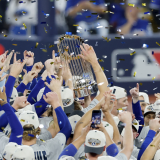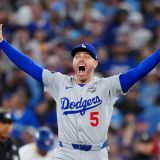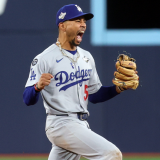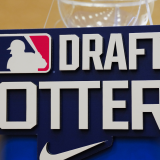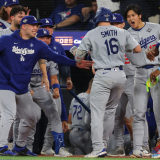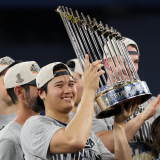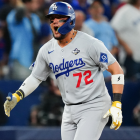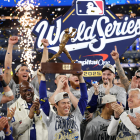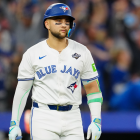
How the Dodgers' offense has failed them in the World Series and why potential lineup changes are limited
The Dodgers, trailing the Blue Jays 3-2 in the World Series, have seen their offense vanish in the Fall Classic
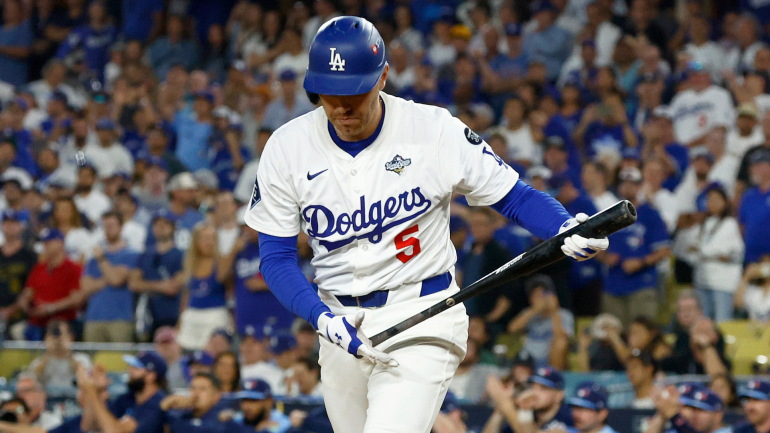
The Los Angeles Dodgers lost to the Toronto Blue Jays on Wednesday night in Game 5 of the 2025 World Seres. The Dodgers, who are hoping to become MLB's first repeat champion since the 1998-2000 New York Yankees, are now in a 3-2 hole in the best-of-seven series. Historically, MLB teams to find themselves in that spot have then lost the series around 70% of the time. In other words, the Dodgers are facing some long odds as the series shifts back to Toronto for Game 6 (and potentially Game 7).
If the Dodgers end up falling short in their bid to repeat, they'll have an unexpected culprit to blame: their offense. Everyone knew the Dodgers bullpen, which tied for the second most meltdowns during the regular season, was a weakness entering the World Series. But no one anticipated that the Dodgers offense, led by stars like Shohei Ohtani and Mookie Betts, would serve as one, too.
After all, these Dodgers led the National League in runs scored and finished second in the majors in park-adjusted offense during the regular season. Yet through five World Series games, the Dodgers have mustered a .651 team-wide OPS and 18 runs in five games. To think: that 3.60 runs per game rate is more kind than the reality of the situation; factor in Game 3's marathon length, and the Dodgers are actually averaging about three runs per nine innings thus far in the World Series. No wonder they trail.
| Dodgers offense | R/G | OPS | HR% | K% |
|---|---|---|---|---|
Regular season | 5.09 | .768 | 3.9% | 21.9% |
Playoffs overall | 4.27 | .728 | 3.4% | 24.3% |
World Series | 3.60 | .651 | 3.7% | 25.3% |
"It doesn't feel great. You clearly see those guys finding ways to get hits, move the baseball forward, and we're not doing a good job of it," manager Dave Roberts said after Game 5. "We've got to make some adjustments. We have seen [Game 6 starter Kevin Gausman] a ton, a lot of our guys have seen him, so we just got to continue to -- I just think we just got to come in fresh, and we've been -- again, like I said, we've been in elimination games, a core group of these guys, and we got to find a way to win a game. That's it."
Just what's hampering Los Angeles' star-studded nine? Scroll with us as we check in on some slumping key contributors and ponder if there are any changes they could make ahead of Game 6.
1. Ohtani's contributions have been great, but concentrated
There's no denying that Ohtani's statistics for the World Series are phenomenal. In the first five games, he's batted .316/.500/.895 with three home runs, five runs batted in, and more walks than strikeouts. The catch is that most of the damage was concentrated within Game 3 and Game 3 alone.
| Ohtani split | H | XBH | RBI+R | OPS |
|---|---|---|---|---|
Overall | 6 | 5 | 10 | 1.395 |
Without Game 3 | 2 | 1 | 4 | .569 |
For those wth short memories: Ohtani notched four extra-base hits (including two home runs) and reached base a record nine times as part of the Dodgers win. It's hard to rail too hard against someone who authored arguably the most impressive offensive performance in World Series history, but the numbers bear out that Ohtani has otherwise had a limited impact on this set:
You may recall earlier in the postseason how the Philadelphia Phillies and Milwaukee Brewers gameplanned to have Ohtani face as many lefty sinkerballers as they could. Not so here. Through five games, the only pitchers he's faced more than twice are Blue Jays starters Trey Yesavage, Kevin Gausman, Shane Bieber and reliever Eric Lauer, who was tasked with bulk work in Game 3.
The Blue Jays' approach seems more focused on limiting Ohtani's exposure to fastballs. So far this series, he's a fastball less than every three pitches. Sliders, curveballs, and sweepers, conversely, account for roughly 40% of his pitches faced.
2. Betts, Freeman, Smith underperforming
The Blue Jays haven't let Ohtani beat them outside of Game 3. They haven't let the Dodgers' other stars do it, either. Shortstop Mookie Betts, first baseman Freddie Freeman, and catcher Will Smith have combined for a .704 OPS this postseason and a .633 mark in the World Series. Those numbers are well beneath their .824 regular season showing -- to think, that's with Betts having a relatively down year.
| Split | Regular season OPS | Postseason OPS |
|---|---|---|
Mookie Betts | .732 | .648 |
Freddie Freeman | .869 | .781 |
Will Smith | .901 | .684 |
All three | .824 | .704 |
Freeman and Smith, for their parts, have been tagging the ball. They've each hammered more than 43% of their batted balls for exit velocities of 95 mph or higher. Those two have combined for four outs on balls that had an expected batting average of around .300 or better, suggesting they've been the victims of some bad luck. It happens, especially in small samples against good defensive clubs.
Betts can't take similar solace. He's put 18 balls into play during the World Series, and 11 of them have had launch angles either above 40 degrees or below minus-10 degrees. In other words, when Betts is connecting he's either skying the ball straight up or drilling into directly into the dirt. Neither of those trajectories tend to result in hits or positive outcomes. It's clear that he's off, either with his mechanics or with his mindset, something Roberts seemed to confirm.
"I think he's pressing," Roberts said after Game 5. "Hopefully, the off day, find a way to get away from it, and then go out there and just kind of focus on one game and be good for one game, go out there and compete. But I think you can see, you know, there's a little anxiousness in there."
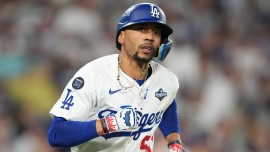
3. Lineup changes possible, if limited
You may wonder if the Dodgers should try mixing up their lineup, in terms of personnel or arrangement. It's something that Roberts conceded he may contemplating heading into Game 6.
"It's kind of whatever I feel is best to take down Gausman," Roberts said after Game 5. "So I'm not sure if it's Mookie in the 2, Mookie in the 3, Freddie in the 3. I'm not sure. But at the end of the day, regardless of who we run out there or what construct, we still got to take good at-bats, all of us. And so that's what I'm betting on."
Realistically, Roberts has only so many dials to turn and levers to pull.
Only five Dodgers have an OPS above .750 this postseason, and two of those are backup catcher Ben Rortvedt and outfielder Alex Call. Rortvedt is, obviously, not going to get the nod ahead of Smith, leaving him with no pathway into the lineup. Call received a start in Game 5, going hitless with a walk. The other three players are Ohtani, Freeman, and Teoscar Hernández -- three of Los Angeles' top five hitters on any given night, alongside Betts and Smith. Roberts already moved Smith up from fourth to second (and Betts and Freeman down a spot each) in Game 5. Might he again drop Betts in Game 6? It's to be seen.
Even if the Dodgers wanted to tinker with their starting nine by swapping in other performers, they lack for options.
Teams aren't allowed to make roster moves during a round except for in the case of an injury. That means the Dodgers are limited to who they have on their bench. Who might that be? Rortvedt, who again has no way into the lineup other than starting over Smith; Call or fellow outfielder Andy Pages (mired in a lengthy skid); infielder Miguel Rojas; or two players, in Hyeseong Kim and Justin Dean, who haven't taken an in-game plate appearance in an MLB game since Sept. 28 and Aug. 26 respectively.
Roberts sticking with his traditional starters isn't because of some blind loyalty -- it's out of necessity. This bunch was good enough to get the Dodgers to this point. Now, it's to be seen if they can rediscover that form before they lose their hard-earned chance at history.


